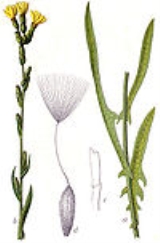
Lactuca saligna
Encyclopedia
Lactuca saligna is a species of wild lettuce
known by the common name willowleaf lettuce, and Least lettuce. It is native to Eurasia but it grows in many other places as an introduced species
, including much of North America.
It can be found rarely in south-east England
on dry banks near the sea and estuaries.
herb growing from a taproot
to heights between one half and one meter, and occasionally taller. It is much slenderer than Great Lettuce Lactuca virosa
and Prickly lettuce Lactuca serriola
. The spindly, mainly erect stem has bristles on its lower portion. The leaves are generally lance-shaped with a few vague lobes and coarse teeth, and their midveins are bristly. The top part of the stem is occupied by a narrow inflorescence
. The branches may be appressed, that is, growing upward parallel to each other, or they may branch outward. The flower head
is up to about 4 centimeters wide when open, with rectangular pale yellow ray florets with toothed tips. The fruit is a dark brown achene
almost a centimeter long with a long white pappus
.
It flowers from July to August.
Lactuca
Lactuca, commonly known as lettuce, is a genus of flowering plants in the daisy family Asteraceae. The genus includes about 100 species, distributed worldwide, but mainly in temperate Eurasia....
known by the common name willowleaf lettuce, and Least lettuce. It is native to Eurasia but it grows in many other places as an introduced species
Introduced species
An introduced species — or neozoon, alien, exotic, non-indigenous, or non-native species, or simply an introduction, is a species living outside its indigenous or native distributional range, and has arrived in an ecosystem or plant community by human activity, either deliberate or accidental...
, including much of North America.
It can be found rarely in south-east England
England
England is a country that is part of the United Kingdom. It shares land borders with Scotland to the north and Wales to the west; the Irish Sea is to the north west, the Celtic Sea to the south west, with the North Sea to the east and the English Channel to the south separating it from continental...
on dry banks near the sea and estuaries.
Description
This is an annualAnnual plant
An annual plant is a plant that usually germinates, flowers, and dies in a year or season. True annuals will only live longer than a year if they are prevented from setting seed...
herb growing from a taproot
Taproot
A taproot is an enlarged, somewhat straight to tapering plant root that grows vertically downward. It forms a center from which other roots sprout laterally.Plants with taproots are difficult to transplant...
to heights between one half and one meter, and occasionally taller. It is much slenderer than Great Lettuce Lactuca virosa
Lactuca virosa
Lactuca virosa is a plant in the Lactuca genus, ingested often for its mild psychotropic effects which are often described as being similar to that of opium. It is related to common lettuce Lactuca virosa is a plant in the Lactuca (lettuce) genus, ingested often for its mild psychotropic...
and Prickly lettuce Lactuca serriola
Lactuca serriola
Prickly Lettuce is an annual or biennial plant, slightly foetid, that is commonly considered a weed of orchards, roadsides and field crops. The closest wild relative of cultivated lettuce , it grows throughout the temperate regions of all major continents. The leaves grow along a spiny stem and...
. The spindly, mainly erect stem has bristles on its lower portion. The leaves are generally lance-shaped with a few vague lobes and coarse teeth, and their midveins are bristly. The top part of the stem is occupied by a narrow inflorescence
Inflorescence
An inflorescence is a group or cluster of flowers arranged on a stem that is composed of a main branch or a complicated arrangement of branches. Strictly, it is the part of the shoot of seed plants where flowers are formed and which is accordingly modified...
. The branches may be appressed, that is, growing upward parallel to each other, or they may branch outward. The flower head
Head (botany)
The capitulum is considered the most derived form of inflorescence. Flower heads found outside Asteraceae show lesser degrees of specialization....
is up to about 4 centimeters wide when open, with rectangular pale yellow ray florets with toothed tips. The fruit is a dark brown achene
Achene
An achene is a type of simple dry fruit produced by many species of flowering plants. Achenes are monocarpellate and indehiscent...
almost a centimeter long with a long white pappus
Pappus (flower structure)
The pappus is the modified calyx, the part of an individual disk, ray or ligule floret surrounding the base of the corolla, in flower heads of the plant family Asteraceae. The pappus may be composed of bristles , awns, scales, or may be absent. In some species, the pappus is too small to see...
.
It flowers from July to August.

